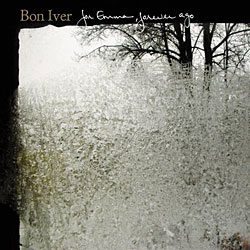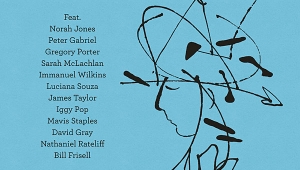| Columns Retired Columns & Blogs |
Recording of May 2008: For Emma, Forever Ago
BON IVER: For Emma, Forever Ago
Jagjaguwar Jag 115 (CD). 2008. Justin Vernon, prod., eng. AAD? TT: 37:15
Performance ****1/2
Sonics ****
Jagjaguwar Jag 115 (CD). 2008. Justin Vernon, prod., eng. AAD? TT: 37:15
Performance ****1/2
Sonics ****
Everyone loves a record with a story, and this left-field near-masterpiece has a sad one to tell. For reasons he never specifically mentions, and which in the end could be plain old narcissism, Justin Vernon, whose nom de amor is Bon Iver, decided to lock himself away one winter in his dad's cabin in Northern Wisconsin with little more than a guitar, an analog recording rig, and a pack of voracious and unnamed torments. Available since fall 2007 at Vernon's gigs, the resulting album has now been reissued on indie label Jagjaguwar, based in Bloomington, Indiana.
 What Vernon has wrought is a powerful, haunting collection of the music of isolation and deep melancholia. Self-pity continually threatens to sink the whole affair, but he successfully keeps it at bay thanks to sturdy songcraft, and melodic turns that lead up rather than further down. Over the course of For Emma, Forever Ago, Vernon's airy and delicate folk music meshes into a light, almost vaporous beauty reminiscent of Iron and Wine—but also, and most obviously, of Neil Young's more grave and rickety musical persona. The music's deliberately rough edges, not to mention Vernon's high, quavery voice, are Young-esque in the extreme. But Vernon's vision encompasses far more than simple borrowings from Young. A shifting, gauzy ambience pervades tunes like "Lump Sum," in which Vernon layers his voice across simple guitar strumming to create an almost religious hue. Time signatures and regular rhythms do not much apply here. He lengthens lines for effect, and often pauses to deliver a particularly meaningful phrase or word.
What Vernon has wrought is a powerful, haunting collection of the music of isolation and deep melancholia. Self-pity continually threatens to sink the whole affair, but he successfully keeps it at bay thanks to sturdy songcraft, and melodic turns that lead up rather than further down. Over the course of For Emma, Forever Ago, Vernon's airy and delicate folk music meshes into a light, almost vaporous beauty reminiscent of Iron and Wine—but also, and most obviously, of Neil Young's more grave and rickety musical persona. The music's deliberately rough edges, not to mention Vernon's high, quavery voice, are Young-esque in the extreme. But Vernon's vision encompasses far more than simple borrowings from Young. A shifting, gauzy ambience pervades tunes like "Lump Sum," in which Vernon layers his voice across simple guitar strumming to create an almost religious hue. Time signatures and regular rhythms do not much apply here. He lengthens lines for effect, and often pauses to deliver a particularly meaningful phrase or word.
One of the album's highlights, "The Wolves (Act I and II)," sets the tone for the entire session: regretful yet inviting. The song's chorus of "what might have been lost" sounds almost alt-gospel, if there were such a thing. In "Skinny Love," yet another number for acoustic guitar and voice with a hooky chorus, the churning pain(s) under the tune are revealed in lyrics that are by turns reckless ("I tell my love to wreck it all / cut out all the ropes and let me fall") and vengeful ("in the morning I'll be with you / But it will be a different 'kind' / I'll be holding all the tickets / and you'll be owning all the fines").
This loneliness-drenched record turns pain into exquisite nectar in the closing cut, "Re: Stacks," in which Vernon sees light at the end of the proverbial tunnel. Over yet another simple but gorgeous melody strummed on guitar, he sings the album's final verse: "This is not the sound of a new man or crispy realization / it's the sound of the unlocking and the lift away / your love will be / safe with me."
The key instrument in the quiet, vulnerable genius of For Emma, Forever Ago is Vernon's fluttery falsetto, which he's close-miked and overdubbed with great skill—a byproduct of the time he spent as an engineer (in the indie rock sense of the word), recording such acts as the Rosebuds and Nola. His voice throughout sounds immediate, at times overly precious—falsetto will always be an acquired taste—but still a very effective vehicle for these feathery songs. Although Vernon mostly keeps his singing ethereal and affecting, he occasionally cuts loose, as in the hooky chorus of "Skinny Love," allowing his emotions to be audibly and very agreeably raw. While most of the songs center on his voice and acoustic guitar, there are a few sparing overdubs of drums and electric guitars ("Blindsided"), pedal steel or a similar effect ("Creature Fear"), and, on several tracks, horns.
Disappearing into the wilderness for your art is not a new move. Henry David Thoreau did it 1845, and Sleater-Kinney, to mention just one indie-rock example, did it for their 2005 record, The Woods. In the end, what makes this spare, idiosyncratic album work is that it hangs together as a coherent collection of art songs. You can feel Vernon's solo journey, and rarely has desolation felt—or sounded—this good.—Robert Baird
- Log in or register to post comments




































